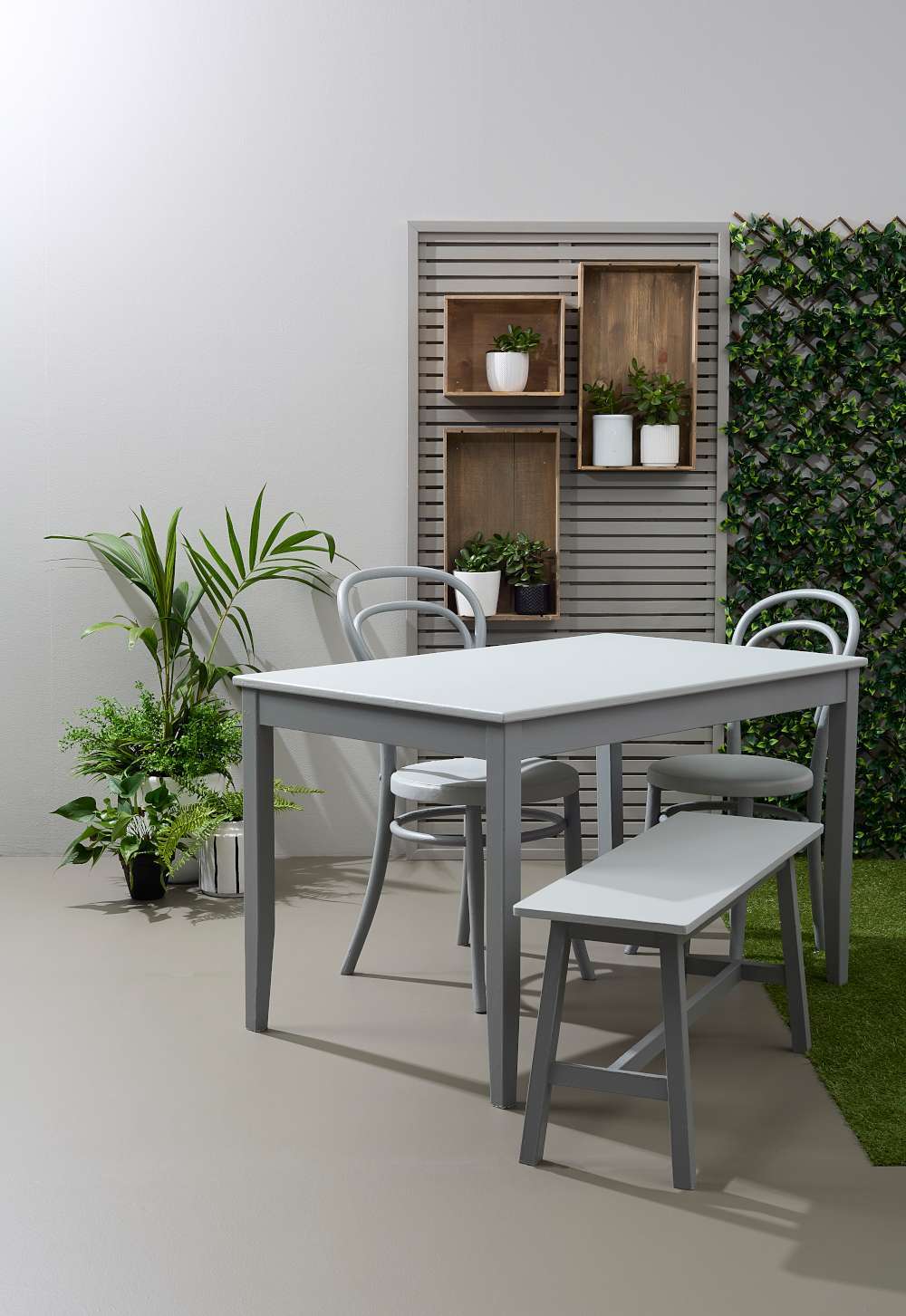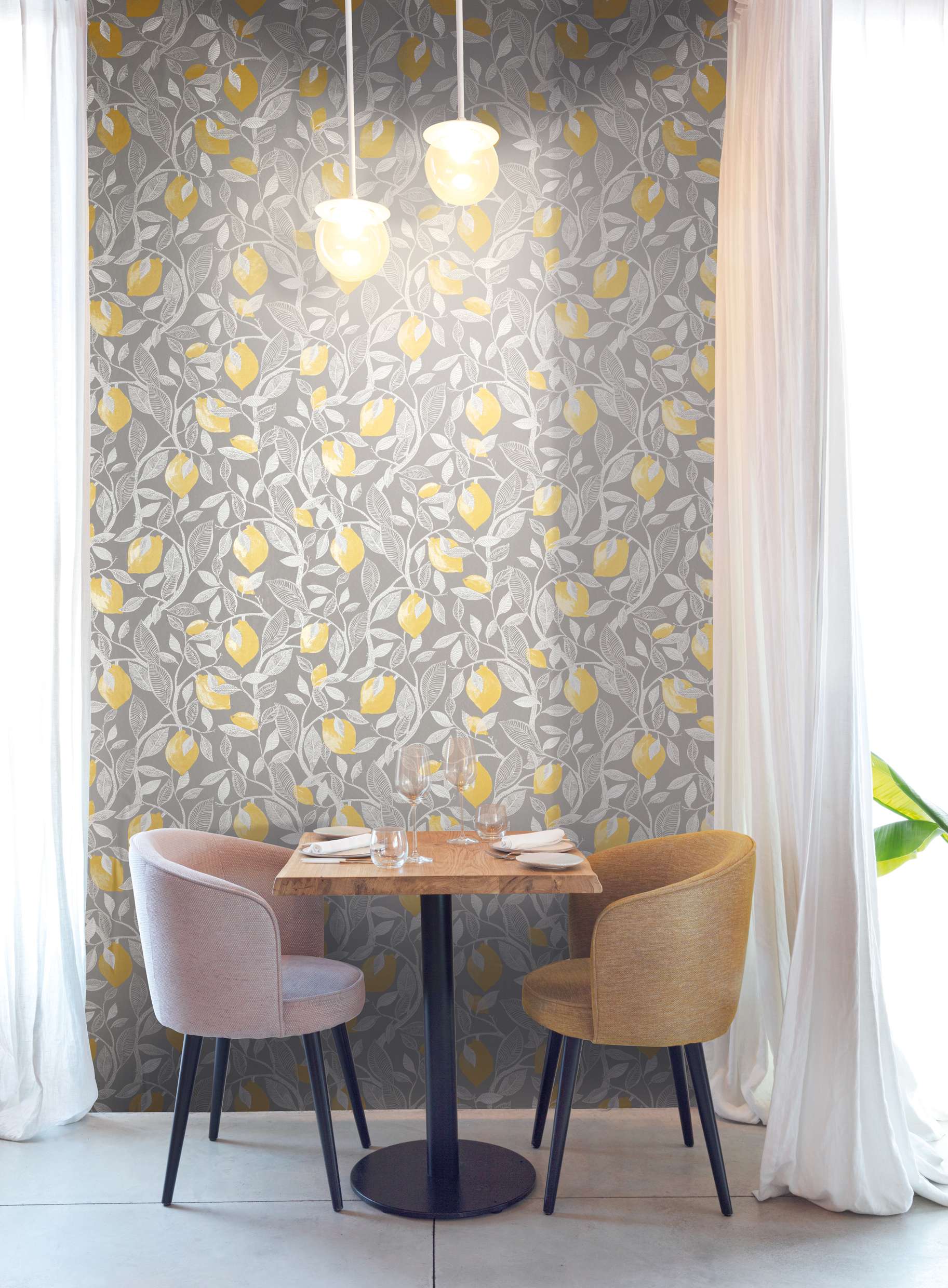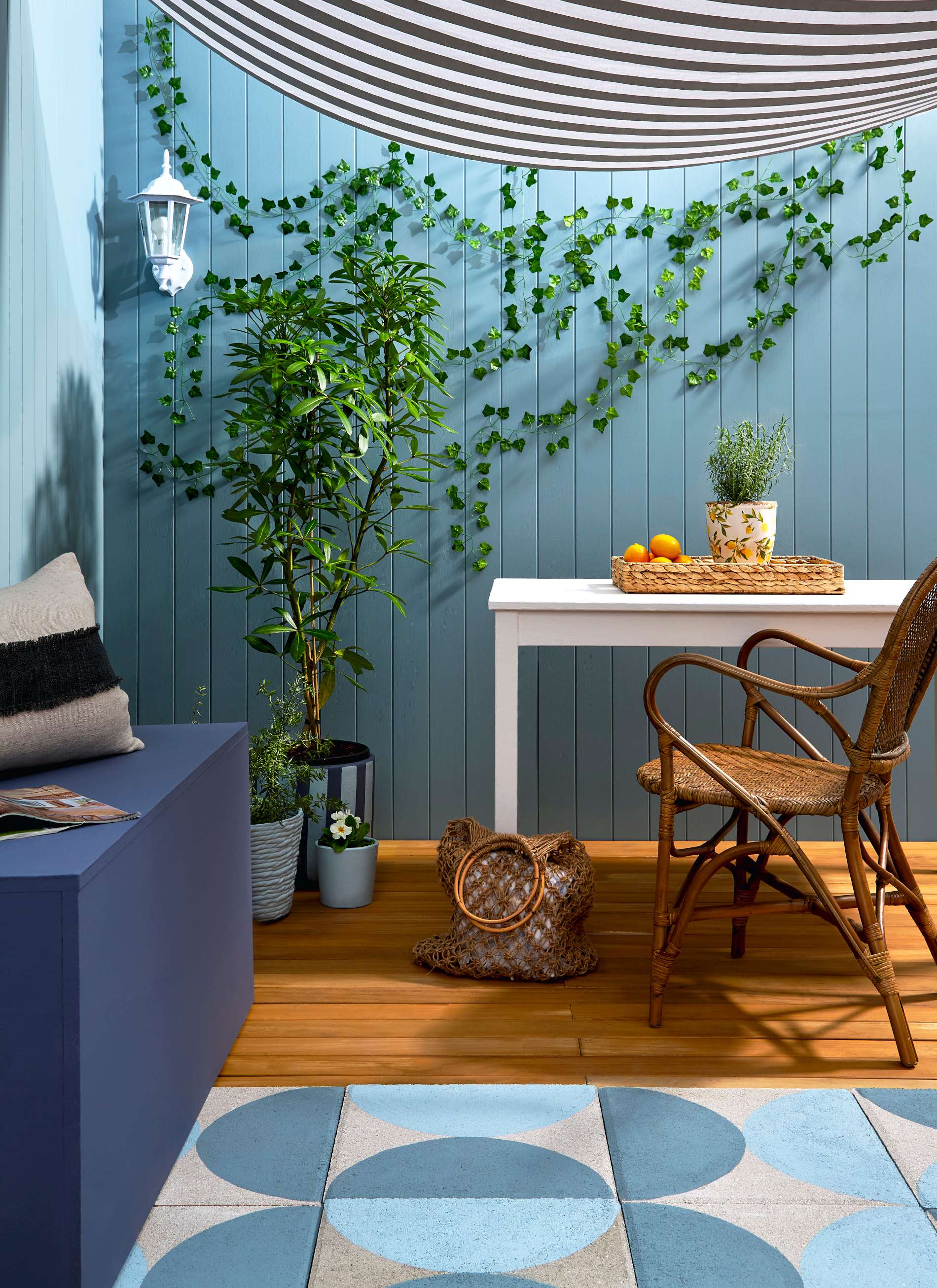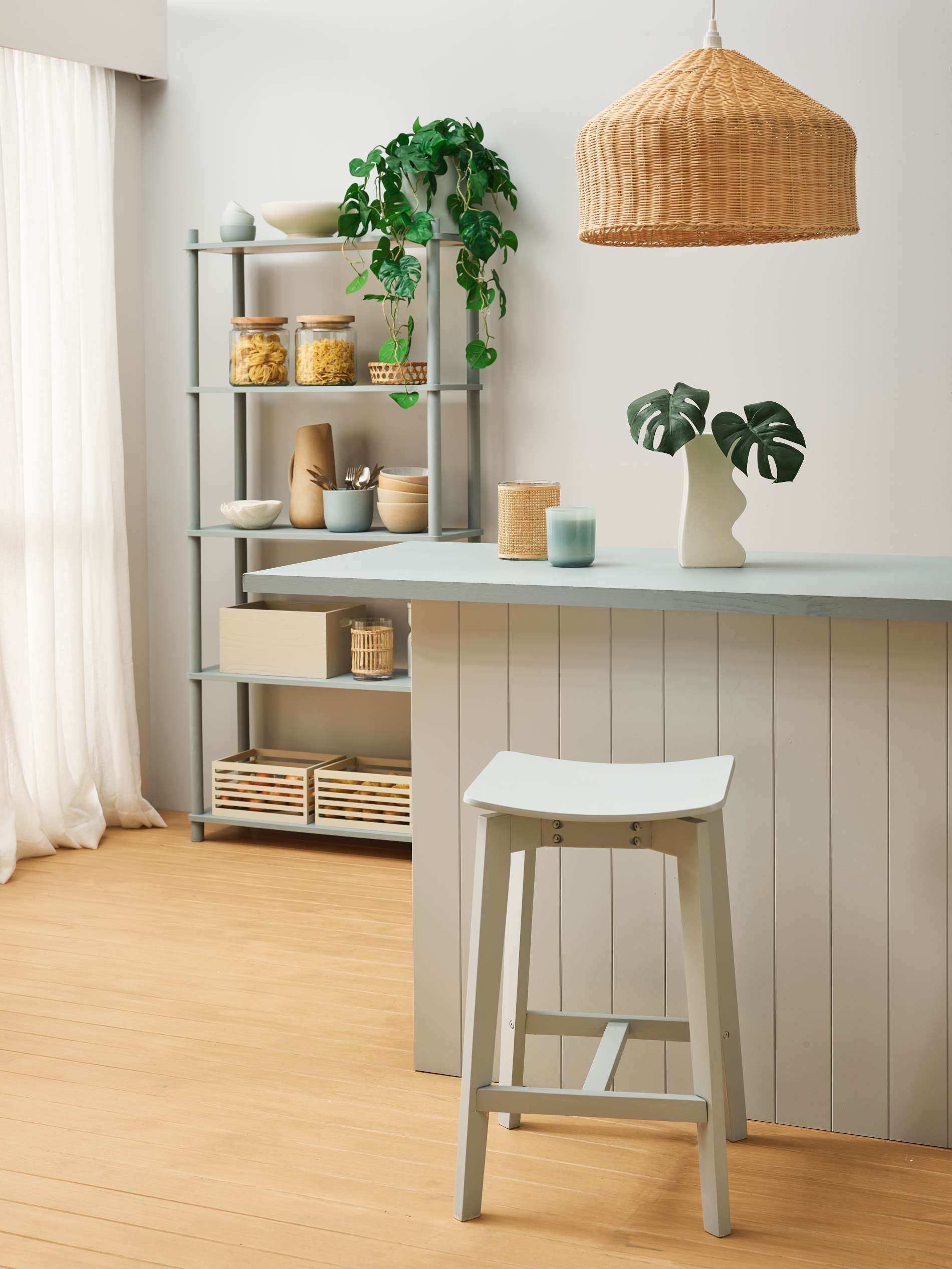As we all emerge from winter hibernation at home, you start to notice the little areas of your house, inside and out, that need some care and attention.
Here’s a quick spring maintenance guide from Resene to the parts of your home you might want to check at this time of the year and how to go about fixing, maintaining or refreshing them so you’re ready for a carefree, relaxing summer.
Inspect exterior paintwork
Winter can be tough on your home exterior. Cold and wet weather can leave behind moss and mildew, while older painted surfaces could be starting to crack and peel.
Start your property search
Take a walk right around your house checking for any areas where the paint has chipped, cracked or faded. Also look for discoloration which can be signs of mould, as well as black, brown or green marks. If you wet the surface, it will develop a slimy texture when mould is present.
Resene colour expert Madison McLeod suggests treating areas of suspected mould with Resene Moss & Mould Killer. Once mould is completely gone, follow up with a good exterior house wash using Resene Paint Prep and Housewash using a soft broom.
Resene paint expert Bryce McDermott recommends gently washing your exterior paintwork once a year to remove any surface contamination, dirt and dust.
“Wash down when you can in cooler parts of the day but pay particular attention to timber areas that can warp under moisture followed by extreme heat. Ask for the Resene CoolColour version if you want to use a dark paint colour on your exterior. Resene ColorShop staff can offer more advice on colours and products suited to your conditions.”

A fresh coat of paint to your outdoor furniture and living areas gives it an immediate lift for spring. This wall is painted in Resene Quarter Friar Greystone and the floor is in Resene Triple Friar Greystone, while the trellis is in Resene Friar Greystone and the wine box shelves are stained in Resene Iroko (large) and Resene Equilibrium (small). The tops of the table and bench seat and the chair set are Resene Delta, while the legs of all the furniture pieces are in Resene Gunsmoke. Tray in Resene Zeus, pots in the wine boxes in Resene Abbey Road, Resene Mamba, Resene Juniper and Resene Opal and the two planters on the ground are Resene Zeus and Resene Alabaster with pinstripes in Resene Nero. Plants from Kings Plant Barn. Project by Megan Harrison-Turner, image by Bryce Carleton.
Don’t be tempted to clean wooden weatherboards - or wooden decks and furniture - by water blasting. The pressure can damage the wood grain and you’ll end up with a rough surface. Keep your water blasting for harder surfaces like concrete, and remember, while water blasting can be useful for removing mould from those surfaces it won’t kill it and prevent it returning, so always treat with Resene Moss & Mould Killer. For a slower clean over time, use Resene Deep Clean.
Top tip: Keep in mind that water from exterior washing will typically end up into the stormwater system, so when using detergents divert water from drains to unsealed ground.
If you have areas with cracking or peeling paint, sand back and repaint. If you’re not sure of the original paint colour, try and save a sample of the paint, about the size of a $2 coin if you can, and take it to your Resene ColorShop for matching.
Look up and down
Don’t forget to check the condition of your roof and pavers and pathways around your exterior.
Check your roof for mould, lichen and leaks. Whether it’s painted steel or tile, checking the surface once a year is essential to making sure it lasts a long time. Give painted roofs a wash and replace any nails that may have rusted or worked loose on older roofs. Check any joins, such as where a flue enters the roof for signs of leaks and flashings. If you find patches of bare iron where paint has weathered and flaked, clean and sand the area then apply a primer such as Resene Galvo One and finish with Resene Summit Roof.
“Roofs are exposed constantly to all sorts of conditions. If you’re planning a darker colour, use Resene Summit Roof in a Resene CoolColour to reduce heat absorption. If your roof is easily accessible, check for moss and lichen and get rid of it if there is. Give the roof a wash down if you think it needs it. Remember to make sure you have the right safety precautions in place to keep yourself safe.” If your roof is high and you’re not confident, hire a professional to check, clean and paint it for you.

Check your interiors for signs of mould and mildew and be sure to fix the source before re-wallpapering and painting. Walls in Resene Wallpaper Collection ILA105. Team it with stained timber finishes in Resene Colorwood Natural and flooring painted in Resene Alabaster.
When it comes to pavers or concrete steps paths spray on Resene Deep Clean and leave it to work with nature for a cleaner surface. Consider treating pavers and concrete steps with Resene Concrete Conserver for ongoing protection. The extra coating will make them easier to clean. If your concrete surfaces are looking a bit worn and tired you could also consider giving them a new lease of life by adding colour using Resene Walk-on for a solid colour finish or Resene Concrete Stain for a stained finish.
Spruce up outdoor living
As the weather warms up, outdoor living spaces will become the heart of your home. Give your deck or patio a thorough clean to remove debris, moss, or dirt that has accumulated over the winter, tending to any mould with Resene Moss & Mould Killer.
Once clean, assess the condition of wood and concrete or paved surfaces. Give wooden furniture or decking a refresh using Resene Woodsman natural wood stain. If the wood has been previously stained, wash it first with Resene Timber and Deck Wash. It’s hard to go lighter from an existing stain, but you can try darker shades like Resene Woodsman Charred Black or Resene Woodsman Treehouse. Just remember your final colour will depend on the wood and existing colour you are staining over.

Revive your outdoors with a vibrant makeover that includes refreshed decking and pavers. This decking is stained in Resene Woodsman Natural with pavers painted in Resene Bluff and Resene Halcyon. Walls painted in Resene Bluff, table in Resene Quarter Blanc, bench seat in Resene Hammerhead, striped pot in Resene Hammerhead and Resene Halcyon, small pot in Resene Halcyon and light in Resene Solitude. Chair, lemon pot, cushion from French Country Collection, tray from Bed, Bath and Beyond. Project by Melle Van Sambeek, image by Bryce Carleton.
For a lighter, more natural look on outdoor furniture or decking, try semi-transparent Resene Furniture and Decking Oil.
“Stains, by their nature, won’t last as long as paint, particularly in coastal conditions. Our recommendation is a maintenance coat every two years, especially in exposed areas,” Bryce says. “Wash furniture and decks with Resene Timber and Deck Wash to open the timber fibres so the wood takes the stain more readily.”
For concrete patios, Resene Concrete Stain or Resene Concrete Wash can add subtle colour to give surfaces a new lease of life and complement your whole exterior colour scheme.
Check any wooden fences for signs of rot or mould and treat or replace. It’s also a good idea to remove any soil sitting up against wood fences, decking or weatherboards as it will trap moisture and cause rotting.
Window dressing
Windows are an important spot to check after winter, as they can move a lot and can be a sources of leaks or even rot, causing swelling and sticking windows, moss and mildew and cracked or flaking paint.
Give all windows, including hinges and latches, a check for signs of wear and to see if they open and close with ease. Some sticking may be resolved with light sanding or adjusting hinges and latches. Treat any signs of mould with Resene Moss & Mould Killer, then sand and repaint.
To address more serious rot, consider repair options with the Repair Care range from Resene ColorShops.
Interior refresh
Spring isn’t just about refreshing the exterior of your home, it’s also a great time to revamp your interior spaces. After a winter spent indoors, your walls might be in need of fresh coats of paint, or at least a wash, to brighten them up and create a more inviting atmosphere.

Simply giving your painted walls a gentle wash can give them a fresh new lease of life. This wall is painted in Resene Half Duck Egg Blue with floor stain washed in Resene Colorwood Bask. Benchtop and shelves in Resene Half Innocence, island base in Resene Duck Egg Blue, stool in Resene Emerge, top shelf bowls in Resene Half Innocence, Resene Emerge and pot in Resene Duck Egg Blue, middle shelf clam bowl and benchtop vase in Resene Villa White, cutlery bowl in Resene Half Innocence and box in Resene Double Tea. Faux plants from Adairs, stool from Nood, curtain from Ezibuy. Project by Vanessa Nouwens, image by Wendy Fenwick.
Start your interior check in those areas of your home exposed to moisture such as bathrooms, kitchens and laundries to check for signs of mould and mildew. It’s also a good idea to check those areas that don’t get a lot of airflow in your home. Those might include the backs of wardrobes and cupboards or behind beds and large pieces of furniture.
Give walls a gentle wash with Resene Interior Paintwork Cleaner to remove any marks. Treat any mildew and mould with Resene Moss & Mould Killer.
Top tip: Pay particular attention to high contact areas such as around light switches as regular touching can cause dirt and oily build up which can mark and damage your paint. Clean with Resene Interior Paintwork Cleaner.
Before repainting or re-wallpapering areas of mould damage, make sure you find the cause of the mould, such as water leaks, so that it doesn’t recur. And always treat the mould before painting over it, otherwise it will just grow through the new paint.
For advice and everything you need for your decorating projects any time of year, visit your local Resene ColorShop. They can help you with everything from prep to priming to painting so you can get a quality finish on your project.







